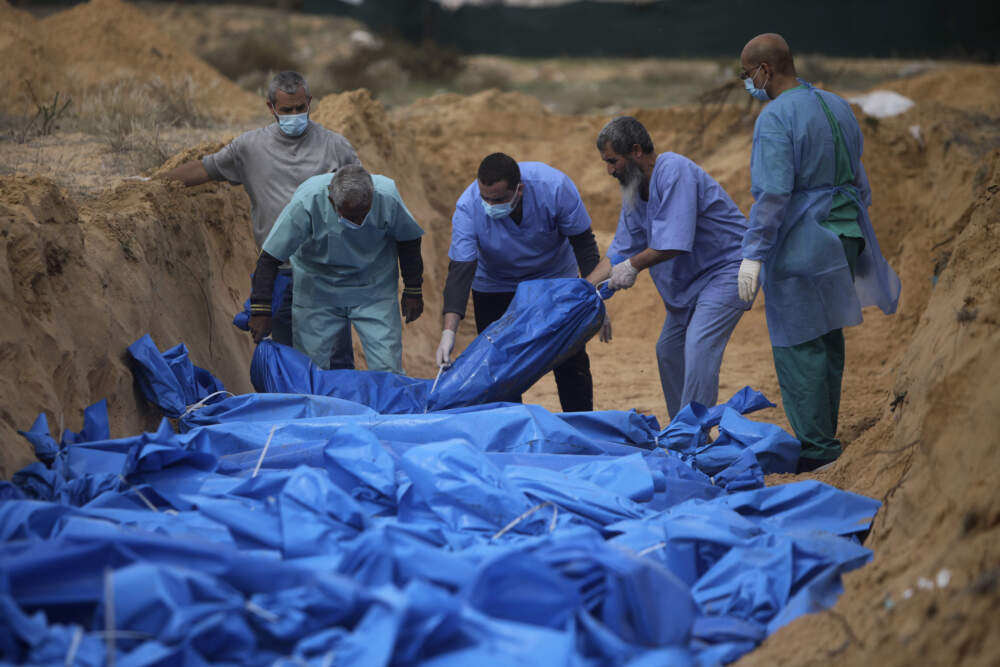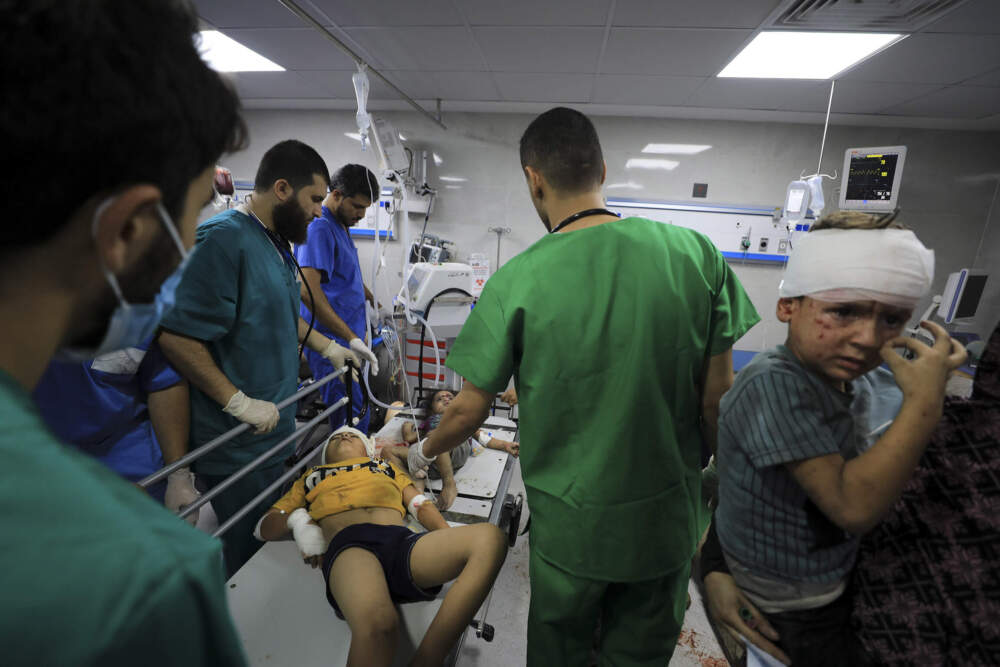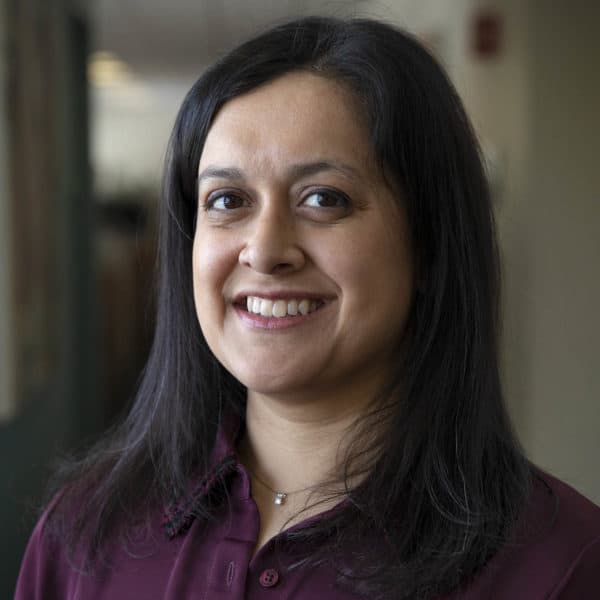Advertisement
War in Gaza feels personal for some Mass. health care workers
ResumeOn a visit to a mental health clinic in Gaza two years ago, Dr. Lianet Vazquez met an 11-year-old girl whose home had been hit in an airstrike.
The girl drew a picture. Vazquez remembers it well.
“There was no green for grass, there was no blue for sky,” she said. “It was just a gray background with corpses on the ground and tombstones and a house that was sort of in flames.”
Vazquez is a resident physician at Massachusetts General Hospital, and she has been thinking about that girl since the current conflict in Israel and Gaza began last month. Is the child safe and still drawing pictures? Is she still alive?
More than 12,000 people have been killed in Israel's bombardment of Gaza, most of them women and children, according to Gaza health officials, although they recently stopped updating the numbers. Israeli forces launched the siege after Hamas attacked Israel on Oct. 7, killing at least 1,200 people and taking about 240 hostages, according to Israeli officials.

The war has triggered a devastating humanitarian crisis in Gaza. Hospitals have not been spared. Most are no longer functioning.
For many doctors in the Boston area, this far-away conflict feels deeply personal. They have colleagues, friends and family members who are fighting to survive — and some who have died.
Israel and Hamas have agreed to a temporary pause in fighting to allow for the release of some hostages and prisoners. But Vazquez is among a growing number of health care workers in Boston and across the U.S. who say a lasting cease-fire is the only way to help suffering civilians.
“We can stop this, and we should,” she said.
Vazquez has watched, heartbroken, as the Gaza hospital where she once worked, Al-Shifa, became a refuge for civilians fleeing violence, then the site of a raid by Israeli troops. Israeli officials say Hamas used tunnels under the hospital for military operations — a claim Hamas denies.
Vazquez has been in contact with friends in the Gaza health system who are toiling in extreme conditions, without water, fuel and medical supplies. “One life you can save, one smile you can restore to a child’s face — I think that’s what drives them,” she said.

Dr. Lara Jirmanus, a primary care physician in Cambridge, has worked in Palestinian refugee camps in Lebanon, always bringing vials of anesthetic or other supplies abundant in the U.S. but scarce in the camps.
Palestinian health care workers are used to working with limited resources, Jirmanus said. But the magnitude of this war is forcing heart-wrenching choices about whose life to try to save.
“Every decision that rations care, every time that you can't save somebody, it weighs on you,” Jirmanus said. “I still think about patients who I've lost in my medical career. It’s hard to not think about them.”
Jirmanus, whose family is Lebanese and Palestinian, is an organizer with the group Boston Healthcare Workers for Palestine. She said doctors have a responsibility to speak out against violence, especially when it affects health care facilities.
While Gaza remains mostly closed off to the world, U.S. doctors who support Israel have been providing medical aid in that country in the aftermath of the Oct. 7 attacks. Dr. Yoav Golan, an infectious disease physician at Tufts Medical Center who is from Israel, said he signed up to help right away.
“I personally know families that were kidnapped and murdered, even though I've been in America for almost 25 years,” he said.
A few weeks ago, Golan traded the safety of his Boston office for an assignment on an intensive care ambulance in the Israeli city of Sderot, near the Gaza border. He became familiar with the sound of sirens, warning of incoming missiles.
“When you're in the ambulance, all you can do is get out and lie down and hope for the best,” he said. “You're always looking for the direction the missile will come. As ridiculous as it may sound, it's part of everyday life there.”
Golan said he’s never seen people — including emergency medical workers — so traumatized.
“People are very, very sad to the very, very core,” he said.
Though Golan has been a critic of the Israeli government, he said he supports the country's right to defend itself and believes a cease-fire won’t resolve the conflict. Only the destruction of Hamas would ultimately help the people of Israel — and Gaza, he said.
Israel has promised to resume its war against Hamas after the temporary pause in fighting. It’s unclear how long the conflict will last, or how long it will take to rebuild what has been destroyed.
The situation for Gaza's health system is "catastrophic," the World Health Organization said this week. Some 1.7 million people have been displaced, and many of them need urgent medical care, WHO officials said.
“This is a completely man-made disaster that's unfolding in the Gaza Strip,” said Dr. Bram Wispelwey, a global health equity physician at Brigham and Women’s Hospital. “These physicians, these nurses are trying to make the best out of a situation where they don't have the tools, they don't have the electricity, they don't have the antiseptic. They’re just running out of everything, and then still trying to do their job.”
Wispelwey went to medical school in Israel, and he spends time each year working in Palestinian refugee camps in the West Bank. “For me, it’s like a second home,” he said. He hopes to return next year.
As the death toll climbs, Dr. Lianet Vazquez said she wishes more people could see the Gaza she remembers.
“Gaza is a place of beauty,” she said. “It's a place of families welcoming you with a cup of tea or a cup of coffee. It's a place where children play around at the beach. It's a place where the sound of music welcomed each sunset, because there were wedding celebrations and birthday celebrations."
One day, she hopes to see that Gaza again.
This article was originally published on November 21, 2023.
This segment aired on November 21, 2023.
